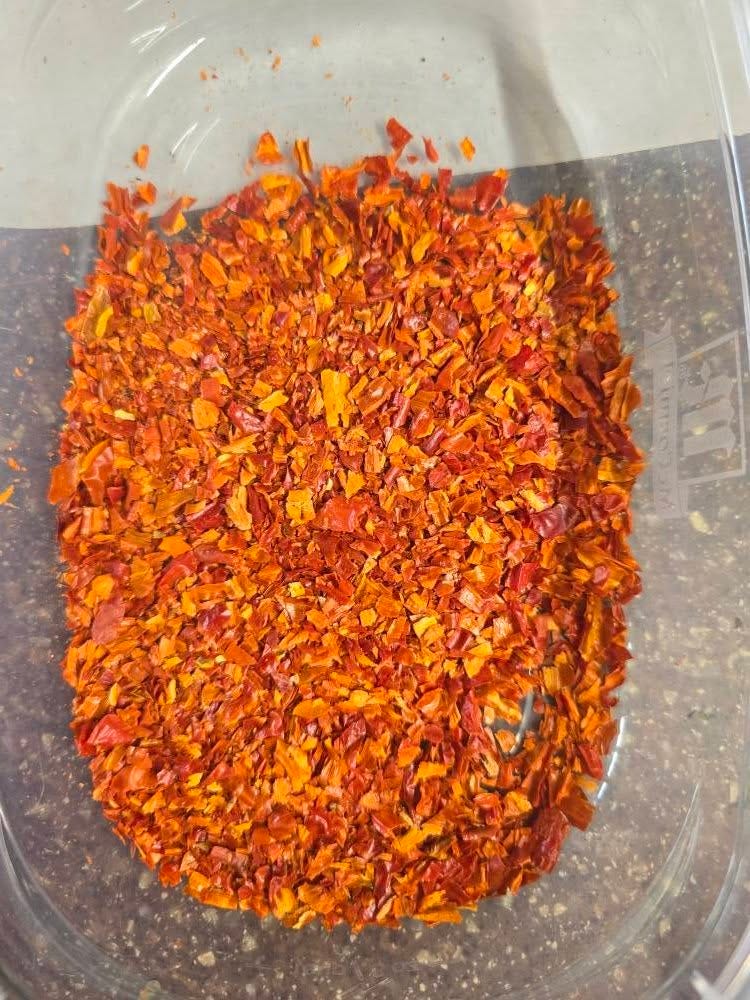Heat & Health: the many surprising benefits of cayenne pepper
In addition to writing (and yes, I am still writing), my husband and I run Glenmirril Farms in the Appalachians. My current works in progress are a set of three books on our journey from suburban convenience to greater self-sufficiency. Part of that process has been learning to garden. Prior to the spring of 2022, I had really never grown anything. That has really changed!
This year’s garden is probably the best we’ve had yet. Our first year we lost a lot to our local groundhog. Last year, it was too small to work comfortably in, which made it unpleasant to work there, compounded by extremely heavy rains. This year, we re-located the garden to a much larger and flatter piece of land on our property, which allowed me to space the plants better.
I’m still learning, so ‘the best so far’ still has its issues. Some plants haven’t done so well, but we have buckets full of cayenne and banana peppers! What to do with that many cayenne peppers!? For the most part, I’ll be drying them and grinding them into cayenne pepper flakes and powder.
Cayenne pepper (Capsicum annuum), a fiery red spice derived from dried and ground chili peppers, has been used for centuries not only as a flavorful culinary staple but also for its potent medicinal properties. Packed with capsaicin, the active compound responsible for its heat, cayenne pepper offers a range of health benefits supported by both traditional use and modern scientific research.
1. Pain Relief and Anti-Inflammatory Properties
The capsaicin with which cayenne pepper is packed, is widely recognized for its pain-relieving properties. It binds to pain receptors (specifically TRPV1 receptors) in the body, causing first a burning sensation, which is then followed by desensitization of the nerves, which reduces the perception of pain.
Topical Applications: Capsaicin creams and patches are commonly used to alleviate chronic pain conditions such as arthritis, neuropathy, and muscle soreness. Studies show that topical capsaicin can significantly reduce pain in conditions like osteoarthritis and diabetic neuropathy by decreasing substance P, a neurotransmitter that signals pain.
Joint and Muscle Pain: Cayenne-based ointments can help soothe joint inflammation and muscle stiffness, making it a popular remedy for athletes and individuals with chronic pain.
2. Boosts Metabolism and Supports Weight Loss
Cayenne pepper is a thermogenic food, meaning it can increase the body’s metabolic rate by generating heat, thus helping with weight loss.
Thermogenesis: Capsaicin stimulates the body to burn more calories by increasing energy expenditure. A 2014 study published in Appetite found that capsaicin consumption increased fat oxidation and reduced appetite, aiding in weight loss efforts.
Appetite Suppression: Cayenne may help curb hunger, making it easier to adhere to a calorie-controlled diet.
It’s easy to add a pinch of cayenne pepper to meals, smoothies, or warm water with lemon to boost metabolism. Start with small amounts to avoid digestive discomfort.
3. Cardiovascular Health Benefits
Some evidence suggests cayenne pepper improves heart health by improving circulation and reducing risk factors associated with cardiovascular disease.
Improved Blood Flow: Capsaicin promotes vasodilation, which enhances blood circulation and may lower blood pressure, which reduces strain on the heart.
Cholesterol Management: Cayenne can lower LDL ("bad") cholesterol levels and triglycerides while increasing HDL ("good") cholesterol.
Clot Prevention: Cayenne’s ability to enhance circulation may reduce the risk of blood clots, though more research is needed to confirm this effect.
Make a point of adding cayenne into soups or stews. However, if you’re on blood-thinning medications, cayenne may interact with them. Talk to your doctor in that case.
4. Digestive Health Support
While some feel that spicy foods harm the stomach, cayenne pepper in moderation is good for digestion.
Stimulates Digestion: Cayenne increases the production of digestive enzymes and gastric juices, aiding in the breakdown of food and nutrient absorption.
Gut Protection: Capsaicin may protect the stomach lining by increasing mucus production, potentially reducing the risk of ulcers caused by Helicobacter pylori or NSAID use.
Relieves Constipation: Cayenne’s stimulating effect on the digestive tract can promote regular bowel movements.
Sprinkle cayenne on meals or mix with water. Avoid too much if you have acid reflux or a sensitive stomach.
5. Anti-Microbial and Immune-Boosting Properties
Cayenne pepper has antimicrobial properties that can help fight infections and support the immune system.
Fights Pathogens: Capsaicin inhibits the growth of certain bacteria and fungi, including H. pylori, which is linked to stomach ulcers.
Immune Support: Cayenne is rich in antioxidants, including vitamins C and A, which help fight oxidative stress and strengthen the immune system.
Sinus Relief: The heat from cayenne can clear nasal congestion by thinning mucus, making it a popular remedy for colds and sinus infections.
Gargle cayenne diluted in water for sore throats. Add it to teas for congestion relief. Use sparingly to avoid irritation.
6. Potential Anti-Cancer Properties
The newest research, though still in early stages of working with animals, points toward capsaicin having anti-cancer effects.
Cell Apoptosis: Capsaicin has been shown to induce apoptosis (programmed cell death) in certain cancer cells, including those associated with prostate, breast, and lung cancers.
Antioxidant Effects: The antioxidants in cayenne may help neutralize free radicals, reducing the risk of cellular damage that can lead to cancer.
These are early studies! Don’t take this as medical advice!
7. Improves Skin and Hair
Cayenne’s high vitamin and antioxidant content benefits skin and hair when used both internally and externally.
Skin Health: The antioxidants in cayenne, such as vitamin C and beta-carotene, promote collagen production and protect against skin damage from free radicals.
Hair Growth: Improved blood circulation from capsaicin can stimulate hair follicles, potentially promoting hair growth when applied topically in diluted forms.
Mix a little cayenne with olive oil for a scalp massage to stimulate hair growth. It’s always a good idea to test for sensitivity first.
Precautions and Considerations
While cayenne pepper offers numerous health benefits, use it in moderation:
Digestive Sensitivity: Excessive consumption can cause stomach irritation, heartburn, or diarrhea, especially for those with GERD or IBS.
Skin Irritation: Topical use can cause burning or irritation, particularly in sensitive individuals.
Drug Interactions: Cayenne may interact with blood thinners, blood pressure medications, and some stomach acid reducers. Talk to your doctor.
Allergies: Some people are allergic to cayenne or other nightshade plants.
It looks like I’ll have plenty of uses for our cayenne pepper! Let me know your favorite recipes that use cayenne or if you use it for any health reasons.
If you like this article, you might also like:
Walleye and Wild Rice Egg Rolls
Cookies of Joy: Medieval Healing Spices
Find my books at all online sources or order from your brick & mortar store
Sources: Information is compiled from scientific studies, health websites, and traditional uses as of September 16, 2025. For specific studies, refer to journals like Appetite (2014) for metabolism effects or Phytotherapy Research for capsaicin’s pain-relieving properties. Always verify with recent research or consult a healthcare provider for personalized advice.








Comments
Post a Comment